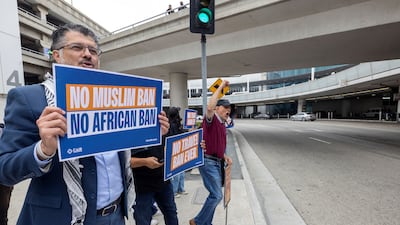The Trump administration is considering a dramatic expansion of its travel ban to include citizens by 36 countries, including Syria and Egypt, according to a US State Department cable seen by The Washington Post.
The internal cable, signed by US Secretary of State Marco Rubio and sent to US diplomatic missions on Saturday, outlined concerns about the listed countries and gave them 60 days to address shortcomings or face possible travel restrictions.
“The department has identified 36 countries of concern that might be recommended for full or partial suspension of entry if they do not meet established benchmarks and requirements within 60 days,” the cable stated.
Among the reasons given are governments’ inability or unwillingness to issue reliable identity documents, “questionable security” of passports, and lack of co-operation in repatriating citizens ordered removed from the US.
The cable also flagged visa overstays, as well as terrorism-related activity, anti-Semitism, and anti-American conduct by nationals from some of the countries. However, it emphasised that not all criteria applied to every country on the list.
The proposed expansion would mark one of the largest enlargements of the travel restrictions first implemented under Mr Trump in 2017, which initially targeted several Muslim-majority countries and sparked widespread protests and legal battles. A list of 12 countries was issued on June 5.
The countries that could face a full or partial ban if they fail to address these concerns within the next 60 days include Angola, Antigua and Barbuda, Benin, Bhutan, Burkina Faso, Cabo Verde, Cambodia, Cameroon, Ivory Coast, the Democratic Republic of the Congo, Djibouti, Dominica, Egypt, Ethiopia, Gabon, The Gambia, Ghana, Kyrgyzstan, Liberia, Malawi, Mauritania, Niger, Nigeria, Saint Kitts and Nevis, Saint Lucia, Sao Tome and Principe, Senegal, South Sudan, Syria, Tanzania, Tonga, Tuvalu, Uganda, Vanuatu, Zambia and Zimbabwe.
This would mark a major expansion of the ban implemented earlier this month, which initially places restrictions on citizens of Afghanistan, Myanmar, Chad, the Republic of the Congo, Equatorial Guinea, Eritrea, Haiti, Iran, Libya, Somalia, Sudan and Yemen.
Additionally, entry restrictions have been partially imposed on individuals from seven other nations: Burundi, Cuba, Laos, Sierra Leone, Togo, Turkmenistan and Venezuela.
The State Department has given those countries until Wednesday to present an initial plan for meeting the new requirements.
The new internal memo comes just a week after Mr Trump reinstated his first-term travel ban, imposing a full entry ban on 12 countries and new travel restrictions on seven others.
